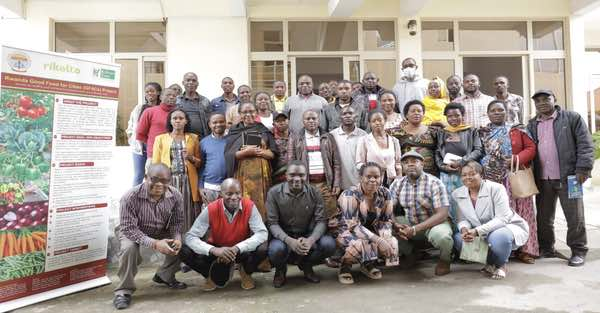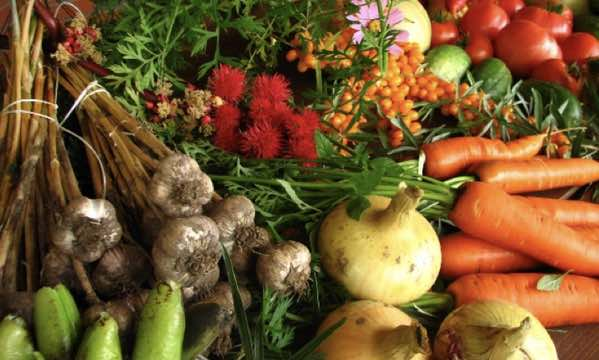
Rubavu Horticulture platform members in a meeting discussing challenges in the horticulture value chain and strategies to provide permanent and reliable access to adequate, safe, local, diversified, fair, healthy and nutritious foods in Rubavu district/ December 2022
A concerted action of relevant stakeholders is required to reach the scale and momentum necessary for inducing large-scale change and impact. Multi-stakeholder platforms (MSPs) are a means of implementation of the Sustainable Development Goals (SDG), as emphasized in SDG17-Partnerships for the goals. Indeed, by bringing together various stakeholders with even conflicting interests, MSPs can be a forum for consultations and, as such, they have the potential to overcome conflict and create synergies.
A sustainable food system lies at the heart of the Sustainable Development Goals (SDGs) that call for major transformations in agriculture and food systems in order to end hunger, achieve food security and improve nutrition by 2030. Food systems approaches consider issues pertaining both to sustainable production and sustainable consumption, to delivering healthy and nutritious diets with minimal environmental impact. The diversity of actors in the food systems and the complex interactions between them call for a high level of inclusiveness if the interests of all relevant groups are to be covered. To facilitate food governance processes, Rwanda Consumer’s Rights Protection Organization (ADECOR) adopted the multistakeholders partnership (MSP) approach that is comprehensive, interdisciplinary and inter-institutional.
A multi-stakeholders horticulture platform in Rubavu has been put in place to discuss an enabling environment for inclusive food chains and food environments. The diversity of actors in the food systems and the complex interactions between them call for a high level of inclusiveness if the interests of all relevant groups are to be covered. At least three clusters of groups of actors are to be considered: the public sector (government), the private sector (small- and large-scale enterprises) and civil society representing consumers and their interests such as initiatives to improve nutrition as well as the environment. The multistakeholders partnership approach is applied knowing that the public and the private sectors, civil society and community-based organizations have major roles to play in feeding cities, bringing experience, innovation and campaigns for more sustainable food systems and mainstreaming the critical need for a socially inclusive and a rights-based approach in urban food systems. Key stakeholders were identified to work across sectors and levels by focusing on building interconnections between actors and fostering collective action mechanisms through participatory food governance structures. In facilitating multi-stakeholder discussion platforms, the participation of most vulnerable groups such as smallholder farmers, women, youth, people living with disabilities and other marginalized groups whose participation could be affected are insured. In fact, the inclusion of marginalized groups is crucial to achieving equity and justice in providing results and to avoiding potential negative distributional consequences of actions undertaken within MSPs. Otherwise, there is a risk that MSPs might reinforce existing power asymmetries between various stakeholders, in particular between the private sector and local communities and populations, but also within the different actors of the private sector itself, especially in places where micro and small businesses are under-represented in favour of big companies.
The MSP has various functions, ranging from resource mobilization, knowledge generation and sharing, capacity building and standard setting to the actual implementation of policies. Broadly speaking, MSPs play an important role in pooling any types of resources that are either necessary or helpful in solving food system problems. MSP helps not only to mobilize new resources, especially from the private sector, but also to reallocate existing resources more appropriately and target them towards food and nutrition security. The economic rationale for MSP is also to correct for market failures in food systems, including power and information asymmetries, environmental and health externalities and suboptimal allocation of resources leading to inequalities in food and nutrition security.
 Rubavu Horticulture platform members during a dialogue meeting discussing about regenerative agriculture, resilient production practices and circular food models, financial institutions engagement and Public- Private- Producers Partnership (4 Ps) in vegetables value chain promotion/ December 2022
Rubavu Horticulture platform members during a dialogue meeting discussing about regenerative agriculture, resilient production practices and circular food models, financial institutions engagement and Public- Private- Producers Partnership (4 Ps) in vegetables value chain promotion/ December 2022
Under the financial support of Belgium Directorate-General for Development Cooperation and Humanitarian Aid (DGD) through RIKOLTO International SON, ADECOR and Kilimo Trust Rwanda are implementing a five years (2022-2026) project “Good Food for Cities- GF4Cs” in Rubavu district with potential upscaling to others cities. The project has three domains of interventions including sustainable food production, inclusive markets and enabling environment. WhileKilimo Trust Rwanda is responsible for implementing sustainable food production and inclusive markets components, ADECOR is responsible for the implementation of the “enabling environment” component whereenabling policies, inclusive financial and normative environment at local and national levels for incentivize healthy, sustainable and nutritious diets. The GF4Cs project aims to make urban food environments more sustainable. The project’s ambition is to catalyze collective action among food system actors including local authorities, food retailers and distributors, producers, citizens, experts, financial institutions and civil society organizations. This is for making urban food environments and food supply chains more conducive to healthy, sustainable and nutritious diets for all citizens as part of resilient and inclusive city region food systems. The project aims to transform the food system with a focus on changing the production, distribution, and consumption practices to ensure that urban food environments and food supply chains in cities are more inclusive, resilient, and enabling healthy, sustainable and nutritious diets (HSN) for all citizens, especially women, youth and vulnerable groups.

The GF4Cs project started by focusing on vegetables value chain. The vegetables value chains direct actors include inputs providers, farmers, collectors, food distribution, value-added processors, marketers and retailers who sell directly to consumers.
Source: Rwanda Consumers’ Right Protection Organization/ADECOR
